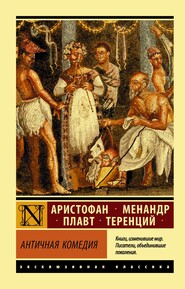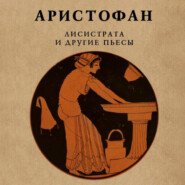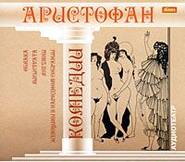По всем вопросам обращайтесь на: info@litportal.ru
(©) 2003-2024.
✖
The Eleven Comedies, Volume 1
Автор
Год написания книги
2018
Настройки чтения
Размер шрифта
Высота строк
Поля
CINESIAS.
A CHILD.
HERALD OF THE LACEDAEMONIANS.
ENVOYS OF THE LACEDAEMONIANS.
POLYCHARIDES.
MARKET LOUNGERS.
A SERVANT.
AN ATHENIAN CITIZEN.
CHORUS OF OLD MEN.
CHORUS OF WOMEN.
SCENE: In a public square at Athens; afterwards before the gates of the Acropolis, and finally within the precincts of the citadel.
* * * * *
LYSISTRATA
LYSISTRATA (alone). Ah! if only they had been invited to a Bacchic revelling, or a feast of Pan or Aphrodité or Genetyllis,[391 - At Athens more than anywhere the festivals of Bacchus (Dionysus) were celebrated with the utmost pomp—and also with the utmost licence, not to say licentiousness.Pan–the rustic god and king of the Satyrs; his feast was similarly an occasion of much coarse self-indulgence.Aphrodité Colias—under this name the goddess was invoked by courtesans as patroness of sensual, physical love. She had a temple on the promontory of Colias, on the Attic coast—whence the surname.The Genetyllides were minor deities, presiding over the act of generation, as the name indicates. Dogs were offered in sacrifice to them—presumably because of the lubricity of that animal.At the festivals of Dionysus, Pan and Aphrodité women used to perform lascivious dances to the accompaniment of the beating of tambourines. Lysistrata implies that the women she had summoned to council cared really for nothing but wanton pleasures.] why! the streets would have been impassable for the thronging tambourines! Now there's never a woman here-ah! except my neighbour Calonicé, whom I see approaching yonder…. Good day, Calonicé.
CALONICÉ. Good day, Lysistrata; but pray, why this dark, forbidding face, my dear? Believe me, you don't look a bit pretty with those black lowering brows.
LYSISTRATA. Oh! Calonicé, my heart is on fire; I blush for our sex. Men will have it we are tricky and sly….
CALONICÉ. And they are quite right, upon my word!
LYSISTRATA. Yet, look you, when the women are summoned to meet for a matter of the last importance, they lie abed instead of coming.
CALONICÉ. Oh! they will come, my dear; but 'tis not easy, you know, for women to leave the house. One is busy pottering about her husband; another is getting the servant up; a third is putting her child asleep, or washing the brat or feeding it.
LYSISTRATA. But I tell you, the business that calls them here is far and away more urgent.
CALONICÉ. And why do you summon us, dear Lysistrata? What is it all about?
LYSISTRATA. About a big affair.[392 - An obscene double entendre; Calonicé understands, or pretends to understand, Lysistrata as meaning a long and thick "membrum virile"!]
CALONICÉ. And is it thick too?
LYSISTRATA. Yes indeed, both big and great.
CALONICÉ. And we are not all on the spot!
LYSISTRATA. Oh! if it were what you suppose, there would be never an absentee. No, no, it concerns a thing I have turned about and about this way and that of many sleepless nights.
CALONICÉ. It must be something mighty fine and subtle for you to have turned it about so!
LYSISTRATA. So fine, it means just this, Greece saved by the women!
CALONICÉ. By women! Why, its salvation hangs on a poor thread then!
LYSISTRATA. Our country's fortunes depend on us—it is with us to undo utterly the Peloponnesians….
CALONICÉ. That would be a noble deed truly!
LYSISTRATA. To exterminate the Boeotians to a man!
CALONICÉ. But surely you would spare the eels.[393 - The eels from Lake Copaďs in Boeotia were esteemed highly by epicures.]
LYSISTRATA. For Athens' sake I will never threaten so fell a doom; trust me for that. However, if the Boeotian and Peloponnesian women join us, Greece is saved.
CALONICÉ. But how should women perform so wise and glorious an achievement, we women who dwell in the retirement of the household, clad in diaphanous garments of yellow silk and long flowing gowns, decked out with flowers and shod with dainty little slippers?
LYSISTRATA. Nay, but those are the very sheet-anchors of our salvation—those yellow tunics, those scents and slippers, those cosmetics and transparent robes.
CALONICÉ. How so, pray?
LYSISTRATA. There is not a man will wield a lance against another …
CALONICÉ. Quick, I will get me a yellow tunic from the dyer's.
LYSISTRATA. … or want a shield.
CALONICÉ. I'll run and put on a flowing gown.
LYSISTRATA. … or draw a sword.
CALONICÉ. I'll haste and buy a pair of slippers this instant.
LYSISTRATA. Now tell me, would not the women have done best to come?
CALONICÉ. Why, they should have flown here!
LYSISTRATA. Ah! my dear, you'll see that like true Athenians, they will do everything too late[394 - This is the reproach Demosthenes constantly levelled against his Athenian fellow-countrymen—their failure to seize opportunity.]…. Why, there's not a woman come from the shoreward parts, not one from Salamis.[395 - An island of the Saronic Gulf, lying between Magara and Attica. It was separated by a narrow strait—scene of the naval battle of Salamis, in which the Athenians defeated Xerxes—only from the Attic coast, and was subject to Athens.]
CALONICÉ. But I know for certain they embarked at daybreak.
LYSISTRATA. And the dames from Acharnae![396 - A deme, or township, of Attica, lying five or six miles north of Athens. The Acharnians were throughout the most extreme partisans of the warlike party during the Peloponnesian struggle. See 'The Acharnians.'] why, I thought they would have been the very first to arrive.
CALONICÉ. Theagenes wife[397 - The precise reference is uncertain, and where the joke exactly comes in. The Scholiast says Theagenes was a rich, miserly and superstitious citizen, who never undertook any enterprise without first consulting an image of Hecaté, the distributor of honour and wealth according to popular belief; and his wife would naturally follow her husband's example.] at any rate is sure to come; she has actually been to consult Hecaté…. But look! here are some arrivals—and there are more behind. Ah! ha! now what countrywomen may they be?
LYSISTRATA. They are from Anagyra.[398 - A deme of Attica, a small and insignificant community—a 'Little Pedlington' in fact.]











